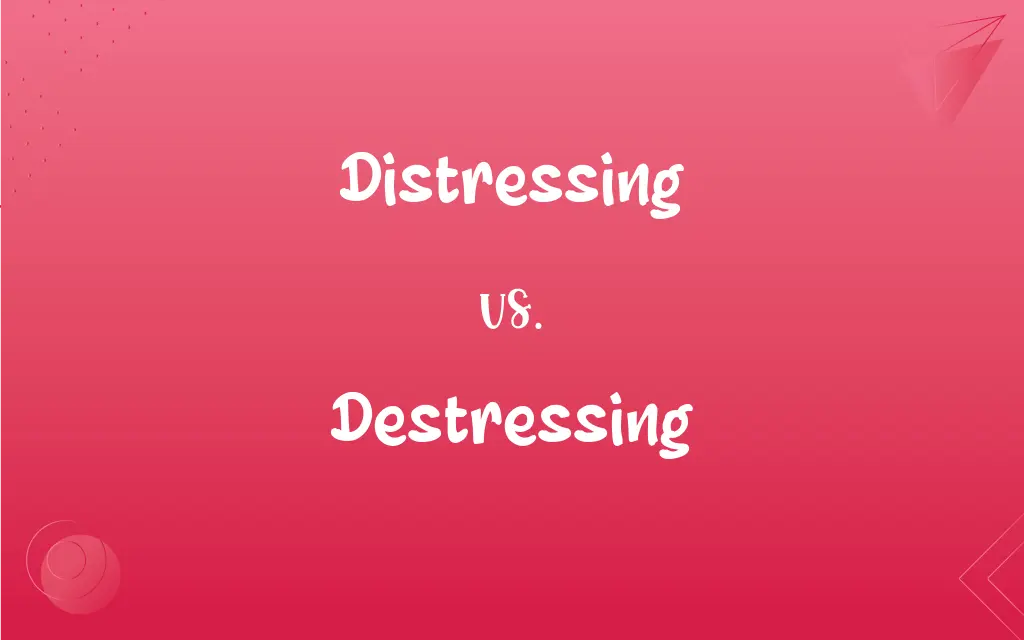Distressing vs. Destressing: What's the Difference?
By Janet White || Updated on May 30, 2024
Distressing refers to causing anxiety or discomfort, while destressing means reducing or relieving stress.

Key Differences
Distressing describes something that causes anxiety, worry, or discomfort. It is an adjective or verb that denotes a negative impact on one's emotional state. Destressing, on the other hand, is the process of reducing or alleviating stress. It is typically used as a verb and involves activities or practices that help calm the mind and body.
Distressing situations often involve unexpected or unpleasant events that trigger emotional or mental strain. These can include personal losses, conflicts, or adverse changes in circumstances. Destressing activities are proactive measures taken to manage and reduce stress levels. They focus on relaxation and self-care, helping individuals regain a sense of balance and calm.
While distressing is associated with negative experiences and emotions, destressing is linked to positive actions aimed at improving one's mental and emotional health. The former induces stress, whereas the latter mitigates it.
Both terms highlight different aspects of dealing with stress, with distressing emphasizing the cause and impact of stress, and destressing focusing on methods to alleviate it.
Comparison Chart
Definition
Causing anxiety or discomfort
Reducing or relieving stress
ADVERTISEMENT
Usage
Adjective, Verb
Verb
Emotional Impact
Negative
Positive
Examples
Bad news, personal conflicts
Yoga, walking, meditation
Focus
Cause and impact of stress
Methods to alleviate stress
Distressing and Destressing Definitions
Distressing
Triggering emotional strain.
Losing his job was a deeply distressing experience.
ADVERTISEMENT
Destressing
Engaging in calming activities.
Walking in the park helps him destress.
Distressing
Inducing worry or sadness.
The distressing situation left her feeling overwhelmed.
Destressing
Reducing or relieving stress.
She practices meditation to destress after work.
Distressing
Causing anxiety or discomfort.
The news of the accident was distressing to everyone involved.
Destressing
Alleviating tension or anxiety.
Listening to music is a great way to destress.
Distressing
Evoking a negative emotional response.
The report on climate change was distressing to read.
Destressing
Managing and reducing stress levels.
Yoga classes are popular for their destressing benefits.
Distressing
To cause strain, anxiety, or suffering to.
Destressing
Promoting relaxation and calmness.
A hot bath can be very effective for destressing.
Distressing
To mar or otherwise treat (an object or fabric, for example) to give the appearance of an antique or of heavy prior use.
Destressing
Present participle of destress
Distressing
(Archaic) To constrain or overcome by harassment.
Destressing
The process of removing stress from a material
Distressing
Anxiety or mental suffering.
Distressing
Bodily dysfunction or discomfort caused by disease or injury
Respiratory distress.
Distressing
Physical deterioration, as of a highway, caused by hard use over time
Pavement distress.
Distressing
The condition of being in need of immediate assistance
A motorist in distress.
Distressing
Suffering caused by poverty
Programs to relieve public distress.
Distressing
(Law) The act of distraining or seizing goods to compel payment or other satisfaction for a debt or other duty owed; distraint.
Distressing
Causing distress; upsetting; distressful.
The details of the ordeal can be distressing to some readers.
Distressing
Present participle of distress
Distressing
Causing distress; painful; unpleasant.
Distressing
In a distressing manner.
Distressing
Causing distress or worry or anxiety;
Distressing (or disturbing) news
Lived in heroic if something distressful isolation
A disturbing amount of crime
A revelation that was most perturbing
A new and troubling thought
In a particularly worrisome predicament
A worrying situation
A worrying time
Distressing
Bad; unfortunate;
My finances were in a deplorable state
A lamentable decision
Her clothes were in sad shape
A sorry state of affairs
Distressing
Creating mental discomfort.
Watching the disturbing movie was quite distressing.
FAQs
Is destressing important for overall well-being?
Yes, destressing is important for maintaining overall well-being and mental health.
What are some examples of distressing events?
Examples of distressing events include personal losses, conflicts, and receiving bad news.
Can distressing be used as a verb?
Yes, distressing can be used as a verb, e.g., "The news distressed her."
What activities can help in destressing?
Activities like meditation, exercise, and hobbies can help in destressing.
Can distressing situations impact mental health?
Yes, distressing situations can negatively impact mental health.
What does distressing mean?
Distressing means causing anxiety, worry, or discomfort.
How can one destress after a long day?
One can destress by engaging in relaxing activities such as taking a walk, practicing yoga, or listening to music.
Is destressing a proactive approach?
Yes, destressing is a proactive approach to managing stress.
Is destressing essential for stress management?
Yes, destressing is essential for effective stress management.
What is the primary goal of destressing?
The primary goal of destressing is to reduce or alleviate stress.
What is a common symptom of a distressing situation?
A common symptom of a distressing situation is a feeling of anxiety or worry.
Can a movie be distressing?
Yes, a movie can be distressing if it evokes negative emotions or discomfort.
Does destressing require special techniques?
Destressing can involve various techniques, but it does not necessarily require special methods; simple activities can be effective.
Do distressing and destressing have opposite meanings?
Yes, distressing and destressing have opposite meanings; one induces stress, while the other reduces it.
Can talking to friends help in destressing?
Yes, talking to friends can be a helpful way to destress.
What kind of news can be distressing?
Bad news, such as reports of accidents or personal losses, can be distressing.
Can a distressing event have long-term effects?
Yes, a distressing event can have long-term effects on mental health.
Is destressing beneficial for physical health?
Yes, destressing can also have positive effects on physical health by reducing stress-related symptoms.
What are common methods of destressing?
Common methods of destressing include meditation, exercise, and engaging in leisure activities.
How does distressing affect daily life?
Distressing can affect daily life by causing emotional strain and reducing overall well-being.
About Author
Written by
Janet WhiteJanet White has been an esteemed writer and blogger for Difference Wiki. Holding a Master's degree in Science and Medical Journalism from the prestigious Boston University, she has consistently demonstrated her expertise and passion for her field. When she's not immersed in her work, Janet relishes her time exercising, delving into a good book, and cherishing moments with friends and family.































































